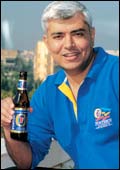|
Last
fortnight, south african breweries (SAB) acquired Miller Brewing
from Philip Morris for $5.6 billion (Rs 27,440 crore), and in the
process became the world's second-largest beer company, after Anheuser-Busch,
the makers of Budweiser. And there could be more action on the acquisition
front from SAB: it is now reportedly eyeing another global beer
major Scottish & Newcastle (S&N), which could result in
the creation of a SAB-Miller-S&N brewing powerhouse.
The repercussions of a SAB-S&N alliance
will instantly be felt back at home. Reason? Vijay Mallya's United
Breweries (UB) has S&N as a 26 per cent partner. A global partnership
between S&N and SAB could well provide the South African brewer
with a toehold in the UB camp, which today dominates the Indian
beer market with a marketshare of just under 40 per cent.
There's scope for further consolidation too
in the 70-75 million case (a case is typically 12 bottles) Indian
beer market. Shaw Wallace, which controls 27 per cent of the beer
market, has decided to bring in a strategic ally into the brewing
business, by selling a 26 per cent holding. SAB, along with Heineken
and Carlsberg, is in the race for this holding too. Clearly, recent
activities in the Indian beer market are more than just froth.
UB, which has been on a shopping spree in recent
times could soon find itself going toe-to-toe, eyeball-to-eyeball,
mug-to-mug, with SAB. Throw in Shaw Wallace, which is in the news
for its efforts to find a strategic partner- read that as global
strategic partner-for its beer business into the script and the
result is a heady cocktail of competition and more competition.
 |
| UB's
Vijay Mallya has decided it's worth sacrificing short-term
profitability on the alter of long-term competitiveness. |
Battle Of The Beer Barons
Since its entry into the Indian market 21 months
ago, SAB has been on an aggressive acquisition spree, picking up
9 million cases of capacity in regions ranging from Uttar Pradesh
to Bangalore to Rajasthan to Aurangabad. UB may still be king by
a long way, with a total capacity of 63 million cases, but the sheer
speed at which the newest entrant into the Indian beer market is
moving, coupled with the alliances taking place overseas, should
have the Indian beer baron worried.
As things stand today, the battle for the beer
bottle appears to be a two-horse race: not so much between the current
No 1 and No 2-UB and Shaw Wallace-but between the No 1 and SAB.
Industry sources don't rule out the Chhabria company eventually
exiting the beer business to focus totally on liquor.
There's Mohan Meakins with a 12 per cent share,
but it's only a matter of time before SAB, which already has 7 per
cent of the market in the bag, creeps ahead. Another MNC in the
race, Foster's India, is moving cautiously, which explains why it
has only a 2 per cent share. However, the company's recent aggressiveness
in Delhi-the market, quite literally, is flooded with the Australian
beer-puts a whole new slant on its articulated strategy of seeking
opportunities.
The regional players control a vital 13 per
cent, and indeed could be ideal takeover candidates for both SAB
and UB. SAB for its part is convinced that the acquisition route
is the quickest way to race ahead of the pack. As Richard Rushton,
Managing Director, SAB India, puts it: "Consolidation through
acquisitions is important in India because setting up a greenfield
brewery, despite the advantage of brewing the beer you know, proves
uneconomical in the long term."
So is UB worried? Well, yes and no. Ravi Nedungadi,
President & CFO, UB Group, is aware of SAB's reputation of injecting
economies of scale into the brewery business. But he feels the Indian
market is a different mug of beer. "To squeeze out efficiencies
from the far-flung breweries of India is not possible... (what's
more) they do not have a class brand... so we are confident of taking
them on and winning," adds Nedungadi.
 |
| SAB's
Richard Rushton is convinced that the acquisitions route
is the quickest way to race ahead of the pack. |
The unique nature of the Indian markets is not
lost on Rushton. He concedes that making small breweries won't be
easy. That's why he's talking about "critical mass, so that
costs can be brought down and the brand developed at the front end."
The battle may be one of just words as of now,
but it will soon wean its way into the beer drinking markets of
the country-which can only expand.
For, the scope for increasing consumption of
beer in India is enormous. In the US and China, for instance, consumption
of beer stands at 220 and 215 million hectolitres, respectively.
In India, it's still just 5.5 million. The
good news, though, is that the domestic market is growing at 10-12
per cent per annum, even as most developed countries have reached
stagnation levels.
So although UB may be head and shoulders above
the rest, the potential for growth that exists in the domestic market
can easily tilt the scales in favour of a new brewer in town.
Of course, increasing beer consumption won't
prove the easiest of tasks, thanks to high prices, distribution
hurdles, and consumer perception. As Deepak Chaudhuri, Director,
Shaw Wallace Breweries, observes: "In view of the high unit
price of beer, a large chunk of beer consumers have turned to hard
liquor leading to stagnation in the industry."
In India, then, beer competes with hard liquor,
which isn't quite the case in developed markets, or developing markets
like China, where it is largely up against soft beverages for share-of-sip.
Also, beer is not too economical to transport,
which explains why manufacturers prefer to have a brewery close
to market. Explains Pradeep Gidwani, Managing Director, Foster's
India: "Every state in India levies different taxes, resulting
in small, inefficient breweries across key markets, and since moving
inter-state is not possible, it is not profitable to bank merely
on a handful of units." For example, a 650 ml of Foster's in
a Maharashtra vend costs Rs 50 and the same retails in Delhi for
Rs 35.
 |
| Foster's
Pradeep Gidwani is looking for strategic and focussed
growth opportunities across the sub-continent. |
On An Acquisition Spree
All these bottlenecks haven't deterred UB from
hitting an acquisition trail of its own. It has little choice, for
it has to pre-empt SAB. Mallya too, like Rushton, isn't keen on
greenfield projects because of the longer gestation period involved,
which could go up to two years-which is a long time in the beer
business.
UB hasn't been afraid to put its money where
its mouth is, by pumping all of Rs 100 crore into acquiring the
Chennai-based Empee Breweries.
Clearly, Mallya has decided it's worth sacrificing
short-term profitability on the altar of long-term competitiveness.
His beer company made a Rs 56-crore loss last year, which the CFO
attributes largely to the acquisitions. "In the past two years
we have made investments of nearly Rs 350 crore in acquiring additional
capacity," explains Nedungadi.
Mallya needs to mop up as much capacity as
he can. For, if No 2 Shaw Wallace falls in the hands of a global
major, UB's numero uno position would, at a stroke, come under threat.
Shaw Wallace, meanwhile, is on its own expansion spree, going after
only capacities, not brands. Over the recent past, the Chhabria
company has amassed seven wholly-owned breweries and 14 contract
manufacturing units.
Says Chaudhuri: "We have entered into
contract arrangements with a number of brewers nationally to roll
out our brands." The thinking at Shaw Wallace is that, in view
of the ban on liquor advertising, it makes more sense to increase
the volumes of existing bestsellers and thus capture a larger chunk
of the market. That explains why Haywards 5000 has been able to
grow by 35 per cent last year.
The Importance Of Alliances
Shaw Wallace, though, has realised that tying
up with a global beer major makes more strategic sense than slugging
it out against the MNCs without a partner. And it's not alone in
sUBscribing to that train of thought.
There's Mount Shivalik Industries too that has
taken a similar tack by opting for a strategic tie-up with Stroh's
International. Reaffirms Monish Bali, Director (Marketing), Mount
Shivalik, which makes Thunderbolt, a popular strong beer brand in
North India. "It is impossible to fight foreign players unless
you have deep pockets and so we've tied up with Stroh's." He
doesn't fail to add: "From all accounts, it seems UB is the
only local brewer who has what it takes to pose a formidable challenge
to the MNC brigade." With some assistance from a MNC, Scottish
& Newcastle.
Internationally, beer is a highly evolved business
and therefore, demand-led. Brands flank across borders and people
know the beer they're drinking. In India, where the market is still
at a nascent stage and highly fragmented, demand orientation seems
a long haul. For the moment, capacity is the name of the game. And
SAB and UB are worthy contenders for the biggest draught of Indian
beer.
-with additional inputs from
Venkatesha Babu
|

